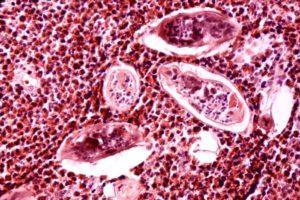Targeting IL-4 receptor alpha mediated signalling: A new therapeutic strategy for fibroproliferative diseases?

Histopathology of schistosomiasis haematobia, bladder. (Public Health Image Library, NIAID, Image ID:35)
Schistosomiasis is a parasitic disease caused by infective helminthes of the trematoda class. It is highly debilitating especially in developing countries where the disease still persists as a major public health threat. The disease is estimated to affect more than 200 million individuals worldwide and kills more than 200,000 annually. A particularly striking feature of the chronic phase of the disease is the fibroproliferative damage to the affected organs which cannot be fully reversed even after anti-parasitic treatment.
A pathogenic role has been suggested for the signaling via Interleukin-4 receptor alpha (IL-4Rα) in fibroproliferative diseases such as allergy response and schistosomiasis. Therefore, researchers from the University of Cape Town aimed to identify the central mechanisms of tissue fibrosis during chronic schistosomiasis to see whether this signaling pathway could be exploited to therapeutically reverse tissue fibrosis in chronically infected individuals.
Dr Justin Nono Komguep described their findings at the International Congress of Immunology (ICI) 2016 showing that they had demonstrated, for the first time, that signaling via IL-4Rα was pivotal in the progression of liver fibrosis during experimental murine schistosomiasis. Using a novel transgenic murine model of inducible interruption of IL-4Rα mediated signaling, they found that the blockade of IL-4Rα powerfully reversed liver fibrosis and scarification in animals chronically-infected with schistosomes with no apparent alteration of the animal fitness.
Dr Komguep’s data indicates that targeting the IL-4Rα receptor may be a safe and viable therapeutic strategy to treat fibroproliferative pathology during chronic schistosomiasis. At present, the therapeutic approach against schistosomiasis solely targets the adult worms and efficiently halts the progression of the infection, but fails to aid the full restoration of the fibrotic organ function in patients. Dr Komguep’s proposed strategy should fill this gap as a follow-up anti-pathology therapy in schistosomiasis-diseased patients to aid them in regaining most, if not all, their organ function following reversal of tissue fibrosis.
More information on the conference – International Congress of Immunology 2016
Article by Thandeka Moyo











